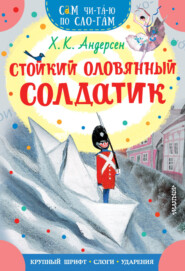По всем вопросам обращайтесь на: info@litportal.ru
(©) 2003-2024.
✖
O. T., A Danish Romance
Настройки чтения
Размер шрифта
Высота строк
Поля
“There my old Rosalie shall live with me,” said Otto; “there she will find her Switzerland. The cows shall have bells on their necks.”
“Lord God! shall they also be made fools of?” exclaimed Jakoba: “that is just exactly as if it were Sophie.”
They went through the avenue where Otto two years before had wept, and had related all his troubles to Louise. He recollected it, and a gentle sigh passed his lips whilst his eyes rested on Louise.
“Now, do you feel yourself happy at home?” asked she; “a lovelier summer’s day than this you certainly have not abroad.”
“Every country has its own beauties,” replied Otto. “Our Denmark is not a step child of Nature. The people here are dearest to me, for I am best acquainted with them. They, and not Nature, it is that makes a land charming. Denmark is a good land; and here also will I look for my happiness.” He seized Louise’s hand; she blushed, and was silent. Happy hours succeeded.
This circle assembled every Sunday; on the third, their delight was greater, was more festal than on any former occasion.
Nature herself had the same expression. The evening was most beautiful; the full moon shone, magnificent dark-blue clouds raised themselves like mountains on the other side the Belt. Afar off sailed the ships, with every sail set to catch the breeze.
Below the moon floated a coal-black cloud, which foretold a squall.
A little yacht went calmly over the water. At the helm sat a boy—half a child he seemed: it was Jonas, the little singing-bird, as Wilhelm had once called him. Last Whitsuntide he had been confirmed, and with his Confirmation all his singer-dreams were at an end: but that did not trouble him; on the contrary, it had lain very heavy upon his heart that he was not to be a fifer. His highest wish had been to see himself as a regimental fifer, and then he should have gone to his Confirmation in his red uniform, with a sabre at his side, and a feather in his hat half as tall as himself. Thus adorned, he might have gone with the girls into the King’s Garden and upon the Round Tower, the usual walk for poor children in Copenhagen. On Confirmation-day they ascend the high tower, just as if it were to gain from it a free view over the world. Little Jonas, however, was confirmed as a sailor, and he now sat at the helm on this quiet night.
Upon the deck lay two persons and slept; a third went tranquilly up and down. Suddenly he shook one of the sleepers, and caught hold on the sail. A squall had arisen with such rapidity and strength, that the vessel in a moment was thrown on her side. Mast and sail were below the water. Little Jonas uttered a shriek. Not a vessel was within sight. The two sleepers had woke in time to cling to the mast. With great force they seized the ropes, but in vain; the sail hung like lead in the water. The ship did not right herself.
“Joseph, Maria!” exclaimed one of them, a man with gray hairs and unpleasing features. “We sink! the water is in the hold!”
All three clambered now toward the hinder part of the vessel, where a little boat floated after. One of them sprang into it.
“My daughter!” cried the elder, and bent himself toward the narrow entrance into the cabin. “Sidsel, save thy life!” and so saying, he sprang into the boat.
“We must have my daughter out,” cried he. One of the ship’s cabin windows was under water; he burst in the other window.
“We are sinking!” cried he, and a horrible scream was heard within.
The old man was German Heinrich, who was about to come with this vessel from Copenhagen to Jutland: Sidsel was his daughter, and therefore he wished now to save her life a second time.
The water rushed more and more into the ship. Heinrich thrust his arm through the cabin-window, he grasped about in the water within; suddenly he caught hold on a garment, he drew it toward him; but it was only the captain’s coat, and not his daughter, as he had hoped.
“The ship sinks!” shrieked the other, and grasped wildly on the rope which held the boat fast: in vain he attempted to divide it with his pocket-knife. The ship whirled round with the boat and all. Air and water boiled within it, and, as if in a whirlpool, the whole sunk into the deep. The sea agitated itself into strong surges over the place, and then was again still. The moon shone tranquilly over the surface of the water as before. No wreck remained to tell any one of the struggle which there had been with death.
The bell tolled a quarter past twelve; and at that moment the last light at the hall was extinguished.
“I will go to Paris,” said Wilhelm, “to my glorious Switzerland; here at home one is heavy-hearted; the gillyflowers on the grave have an odor full of melancholy recollections. I must breathe the mountain air; I must mingle in the tumult of men, and it is quite the best in the world.”
Otto closed his eyes; he folded his hands.
“Louise loves me,” said he. “I am so happy that I fear some great misfortune may soon meet me; thus it used always to be. Whilst German Heinrich lives I cannot assure myself of good! If he were away, I should be perfectly tranquil, perfectly happy!”
notes
1
Note: Literal translation of the real words of a showman.
2
Translator’s Note: Name of one of the heroes in Waldemar the Conqueror, a romance by Ingemann.
3
Note: This superstition of the people is mentioned in Thieles’s Danish traditions: “When a girl at midnight stretches between four sticks the membrane in which the foal lies when it is born, and then creeps naked through it, she will bear her child without pains; but all the boys she conceives will become were-wolves, and all the girls nightmares. You will know them in the daytime by their eyebrows grown together over the nose. In the night she creeps in through the key-hole, and places herself upon the sleeper’s bosom. The same superstition is also found in German Grimm speaks thus about it: If you say to the nightmare,—
Old hag, come to-morrow,
And I from you will borrow,
it retreats directly, and comes the next morning in the shape of a man to borrow something.”
4
Author’s Note: It is true that serfdom is abolished, but the peasant is still not quite free; neither can he be so. For his house and land he must pay a tribute, and this consists in labor. His own work must give way to that of his lord. His wagon, which he has had prepared to bring home his own harvest, must, if such be commanded, go to the nobleman’s land, and there render service. This is, therefore, a kind of tax which he pays, and for the faithful payment of which he is rewarded by a harvest and mowing-feast; at the latter he receives a certain quantity of brandy, and as much ale as he can drink. The dance generally takes place in the middle of the court-yard, and the dancers themselves must pay their musicians.
5
Author’s Note: “Itri,” Fra Diavolo’s birthplace, lies in the Neapolitan States, on the highway between Rome and Naples. The inhabitants are not, without reason, suspected of carrying on the robber’s trade.
6
Author’s Note: A number of years ago a band of men were seized in Vissenberg who had forged bank-notes.
7
Translator’s Note: The unhappy wife of Christian VII. and daughter of our George III.
8
Author’s Note: A village in the canton Neufchâtel, lying close upon the river Doub, where it forms the boundary between Switzerland and France.
9
Author’s Note: Astragalus baeticus is used as a substitute for coffee, and is principally grown upon the sand-hills west of Holmsland. It is first freed from the husk, and then dried and roasted a little.
10
Author’s Note: A “Bakke” consists of three lines, each of 200 Danish ells, or about 135 yards, and of 200 fishing-hooks; the stretched “Bakke” is thus about 200 yards, with 600 hooks; these are attached to the line with strings half an ell long and as thick as fine twine. To each “Bakke” belongs a square trough, on which it is carried on board. To a larger fishing-boat are reckoned six lots of hooks; each lot has eight to nine “Bakkes.”
11
Note: Sketches of Every-day Life.
12
Author’s Note: At the end of the last century it was felled, and two younger ones, which are now in full growth, planted in its stead.
13
“Lord God! shall they also be made fools of?” exclaimed Jakoba: “that is just exactly as if it were Sophie.”
They went through the avenue where Otto two years before had wept, and had related all his troubles to Louise. He recollected it, and a gentle sigh passed his lips whilst his eyes rested on Louise.
“Now, do you feel yourself happy at home?” asked she; “a lovelier summer’s day than this you certainly have not abroad.”
“Every country has its own beauties,” replied Otto. “Our Denmark is not a step child of Nature. The people here are dearest to me, for I am best acquainted with them. They, and not Nature, it is that makes a land charming. Denmark is a good land; and here also will I look for my happiness.” He seized Louise’s hand; she blushed, and was silent. Happy hours succeeded.
This circle assembled every Sunday; on the third, their delight was greater, was more festal than on any former occasion.
Nature herself had the same expression. The evening was most beautiful; the full moon shone, magnificent dark-blue clouds raised themselves like mountains on the other side the Belt. Afar off sailed the ships, with every sail set to catch the breeze.
Below the moon floated a coal-black cloud, which foretold a squall.
A little yacht went calmly over the water. At the helm sat a boy—half a child he seemed: it was Jonas, the little singing-bird, as Wilhelm had once called him. Last Whitsuntide he had been confirmed, and with his Confirmation all his singer-dreams were at an end: but that did not trouble him; on the contrary, it had lain very heavy upon his heart that he was not to be a fifer. His highest wish had been to see himself as a regimental fifer, and then he should have gone to his Confirmation in his red uniform, with a sabre at his side, and a feather in his hat half as tall as himself. Thus adorned, he might have gone with the girls into the King’s Garden and upon the Round Tower, the usual walk for poor children in Copenhagen. On Confirmation-day they ascend the high tower, just as if it were to gain from it a free view over the world. Little Jonas, however, was confirmed as a sailor, and he now sat at the helm on this quiet night.
Upon the deck lay two persons and slept; a third went tranquilly up and down. Suddenly he shook one of the sleepers, and caught hold on the sail. A squall had arisen with such rapidity and strength, that the vessel in a moment was thrown on her side. Mast and sail were below the water. Little Jonas uttered a shriek. Not a vessel was within sight. The two sleepers had woke in time to cling to the mast. With great force they seized the ropes, but in vain; the sail hung like lead in the water. The ship did not right herself.
“Joseph, Maria!” exclaimed one of them, a man with gray hairs and unpleasing features. “We sink! the water is in the hold!”
All three clambered now toward the hinder part of the vessel, where a little boat floated after. One of them sprang into it.
“My daughter!” cried the elder, and bent himself toward the narrow entrance into the cabin. “Sidsel, save thy life!” and so saying, he sprang into the boat.
“We must have my daughter out,” cried he. One of the ship’s cabin windows was under water; he burst in the other window.
“We are sinking!” cried he, and a horrible scream was heard within.
The old man was German Heinrich, who was about to come with this vessel from Copenhagen to Jutland: Sidsel was his daughter, and therefore he wished now to save her life a second time.
The water rushed more and more into the ship. Heinrich thrust his arm through the cabin-window, he grasped about in the water within; suddenly he caught hold on a garment, he drew it toward him; but it was only the captain’s coat, and not his daughter, as he had hoped.
“The ship sinks!” shrieked the other, and grasped wildly on the rope which held the boat fast: in vain he attempted to divide it with his pocket-knife. The ship whirled round with the boat and all. Air and water boiled within it, and, as if in a whirlpool, the whole sunk into the deep. The sea agitated itself into strong surges over the place, and then was again still. The moon shone tranquilly over the surface of the water as before. No wreck remained to tell any one of the struggle which there had been with death.
The bell tolled a quarter past twelve; and at that moment the last light at the hall was extinguished.
“I will go to Paris,” said Wilhelm, “to my glorious Switzerland; here at home one is heavy-hearted; the gillyflowers on the grave have an odor full of melancholy recollections. I must breathe the mountain air; I must mingle in the tumult of men, and it is quite the best in the world.”
Otto closed his eyes; he folded his hands.
“Louise loves me,” said he. “I am so happy that I fear some great misfortune may soon meet me; thus it used always to be. Whilst German Heinrich lives I cannot assure myself of good! If he were away, I should be perfectly tranquil, perfectly happy!”
notes
1
Note: Literal translation of the real words of a showman.
2
Translator’s Note: Name of one of the heroes in Waldemar the Conqueror, a romance by Ingemann.
3
Note: This superstition of the people is mentioned in Thieles’s Danish traditions: “When a girl at midnight stretches between four sticks the membrane in which the foal lies when it is born, and then creeps naked through it, she will bear her child without pains; but all the boys she conceives will become were-wolves, and all the girls nightmares. You will know them in the daytime by their eyebrows grown together over the nose. In the night she creeps in through the key-hole, and places herself upon the sleeper’s bosom. The same superstition is also found in German Grimm speaks thus about it: If you say to the nightmare,—
Old hag, come to-morrow,
And I from you will borrow,
it retreats directly, and comes the next morning in the shape of a man to borrow something.”
4
Author’s Note: It is true that serfdom is abolished, but the peasant is still not quite free; neither can he be so. For his house and land he must pay a tribute, and this consists in labor. His own work must give way to that of his lord. His wagon, which he has had prepared to bring home his own harvest, must, if such be commanded, go to the nobleman’s land, and there render service. This is, therefore, a kind of tax which he pays, and for the faithful payment of which he is rewarded by a harvest and mowing-feast; at the latter he receives a certain quantity of brandy, and as much ale as he can drink. The dance generally takes place in the middle of the court-yard, and the dancers themselves must pay their musicians.
5
Author’s Note: “Itri,” Fra Diavolo’s birthplace, lies in the Neapolitan States, on the highway between Rome and Naples. The inhabitants are not, without reason, suspected of carrying on the robber’s trade.
6
Author’s Note: A number of years ago a band of men were seized in Vissenberg who had forged bank-notes.
7
Translator’s Note: The unhappy wife of Christian VII. and daughter of our George III.
8
Author’s Note: A village in the canton Neufchâtel, lying close upon the river Doub, where it forms the boundary between Switzerland and France.
9
Author’s Note: Astragalus baeticus is used as a substitute for coffee, and is principally grown upon the sand-hills west of Holmsland. It is first freed from the husk, and then dried and roasted a little.
10
Author’s Note: A “Bakke” consists of three lines, each of 200 Danish ells, or about 135 yards, and of 200 fishing-hooks; the stretched “Bakke” is thus about 200 yards, with 600 hooks; these are attached to the line with strings half an ell long and as thick as fine twine. To each “Bakke” belongs a square trough, on which it is carried on board. To a larger fishing-boat are reckoned six lots of hooks; each lot has eight to nine “Bakkes.”
11
Note: Sketches of Every-day Life.
12
Author’s Note: At the end of the last century it was felled, and two younger ones, which are now in full growth, planted in its stead.
13

















